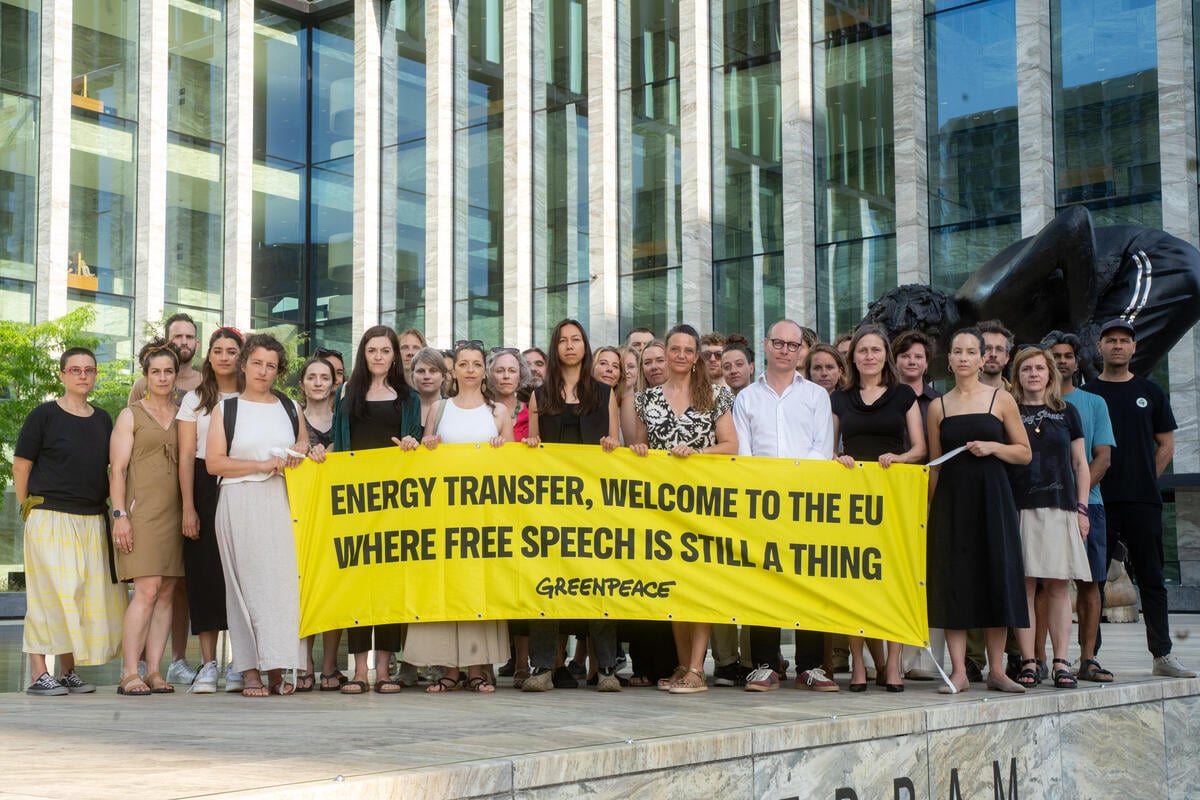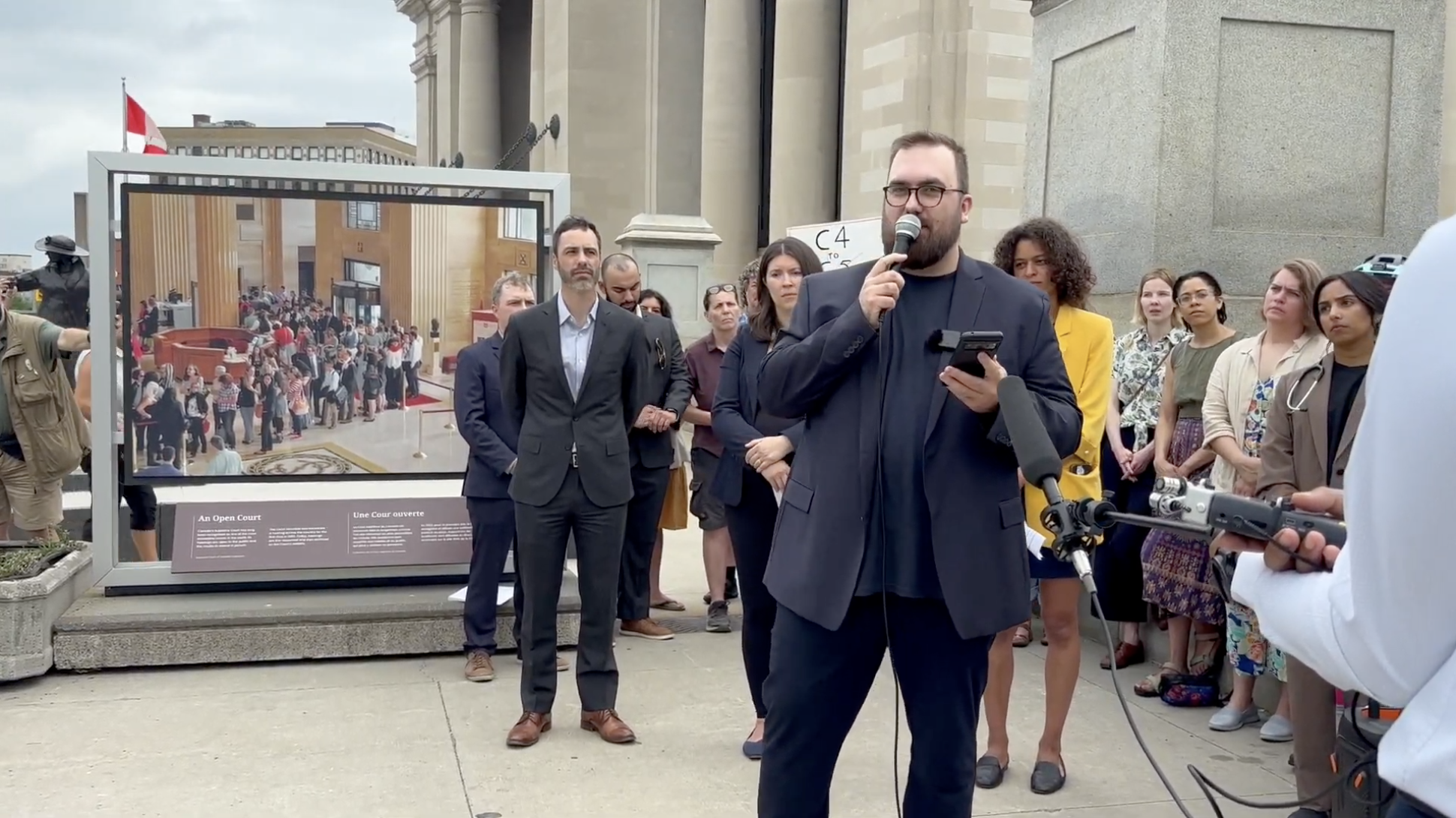Events Are Taking Place At 40 RBC Branches, The Most Of Any Of the 26 Participating Countries, In A Global Coordinated Banks Protest
(Montreal / Toronto / Vancouver) — Thousands of Canadians across the country are today protesting Canada’s largest bank, RBC, which refuses to stop financing fossil fuels. RBC has invested more than $200 billion in fossil fuel projects since the Paris Climate Agreement was signed. These include projects that violate Indigenous rights, like the Coastal GasLink pipeline.
With COP26 focused heavily on the role of finance in the climate crisis, protests are also taking place today at banks across the UK, US, and Europe, with Greta Thunberg attending a protest at Standard Chartered Bank in London. Actions are expected across Africa, South America, Australia, and Europe. Images and news of the day are available here.
“It’s time for Canada’s biggest bank and largest fossil fuel financier to stop the greenwashing and start helping our country meet its climate goals and attempts at reconciliation with Indigenous Peoples. That means ending financing of rights violating coal, oil and gas companies and scaling up investments in real climate solutions,” said Richard Brooks, Climate Finance Director with Stand.earth.
On Wet’suwet’en Territory, Indigenous leaders from Gidimt’en Checkpoint are protesting at the drill site under the WedzinKwa River. In Toronto, participants are blocking Wellington Street in the heart of the financial district. In Montreal, groups are rallying in front of RBC’s offices. Protests are also happening in Vancouver, Ottawa, and more than 30 other locations.
“Coastal Gaslink criminalizes and arrests chief Dsta’hyl of the Likhtsamisyu clan and a young Gixtsan chief for being on their territory, and refuses them access to their lands,” explains Eve Saint of the Wet’suwet’en nation. “How can RBC fund this project while pretending to work towards reconciliation?”
In Canada, the focus on RBC is due to its exceptionally high financing of fossil fuels compared to other banks, as well as its hypocrisy in funding projects on unceded Indigenous territory such as the Coastal Gaslink Pipeline. RBC has poured $208 billion into fossil fuels since the Paris accords and is a major lender to the CGL pipeline, which Wet’suwet’en Land Defenders are resisting. RBC has publicly lauded itself on its inclusive approach with Indigenous communities built on “mutual respect and shared values.” But, if built, the Coastal Gaslink Pipeline RBC funds would expedite the construction of subsequent bitumen and fracked gas pipelines, and create incentive for gas companies to tap into shale deposits along the pipeline right of way.
Organizing groups include Greenpeace, Climate Pledge Collective, Gidimt’en Land Defenders, Banking on a Better Future, Leadnow, Stand.Earth, Extinction Rebellion Quebec, Quit RBC, CEVES, Divest McGill, Climate Justice UBC.
ENDS
For images and for more information, please contact:
Laura Bergamo, Communications Officer, Greenpeace Canada (Eastern Time)
+1 438-928-5237; [email protected]
Ziona Eyob, Media Director – Canada, Stand.earth (Pacific Time)
+1 604 757 7279; [email protected]
Local organizers:
Wet’suwet’en Territory: Eve Saint (647) 569-9962
Toronto: Sabrina Bowman, [email protected]
Vancouver: Arshia Uppal, [email protected]
Montréal: Laura Bergamo, 1 438-928-5237
Note to editors:
RBC and reconciliation: Climate justice advocates denounce RBC’s hypocrisy.
Momentum around divestment and the CGL pipeline: The momentum to stop banks from financing the climate crisis is stronger than ever. Thursday night, members of Extinction Rebellion Quebec scaled a building and installed banners denouncing RBC’s role in climate destruction and colonialism. This week, a new report from the DivestInvest movement dealt a major blow to the fossil fuel industry showing that not only has $39.8 trillion worth of assets under management committed to some form of fossil fuel divestment, but that creating climate friendly portfolios are now financially beneficial. The week prior, over 100 groups endorsed a letter issued by the Wet’suwet’en to over 35 Coastal GasLink investors and banks in Australia, Canada, China, Germany, Japan, Malaysia, the Netherlands, Singapore, South Korea, and the United States. The letter demands investors and banks — including JP Morgan Chase, Citibank, RBC, Scotiabank, BMO, Royal Dutch Shell, and CaixaBank — cease and withdraw all support from Coastal GasLink and highlights how financing the project violates Indigenous rights and breaks any investor commitments to racial justice, reconciliation, and social responsibility. Earlier this month, over 90 groups including Stand.earth, Indigenous Climate Action, 350.org, Sierra Club, Positive Money, and Greenpeace Canada wrote to UN Special Envoy Mark Carney and placed ads in the Financial Times and Toronto Star urging him to stop greenwashing financial institutions that continue to invest in expanding fossil fuel infrastructure.
Bank net zero commitments: RBC and the other big Canadian banks have joined the Net-Zero Banking Alliance and committed to aligning their business practices with the goals of the Paris Agreement and achieving net zero emissions by 2050. However all these banks continue to finance fossil fuel expansion, despite the International Energy Agency concluding in its landmark net-zero report that achieving net zero requires an immediate end to fossil fuel expansion.
Reports:
- Divest-Invest 2021
- Banking on Climate Chaos (Rainforest Action Network)
- Fossil fuel financing in Canada: Financial flows & balance sheet impacts (Greenpeace)



